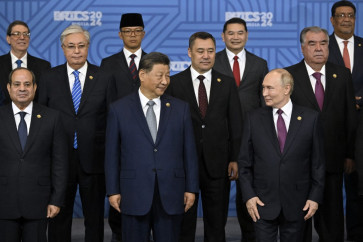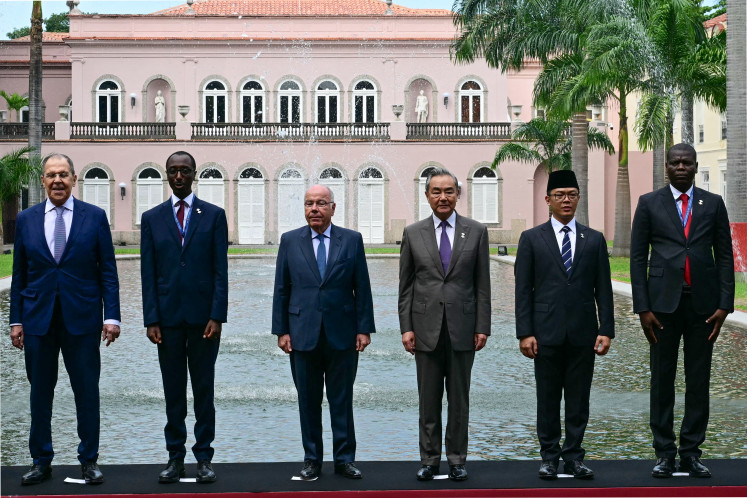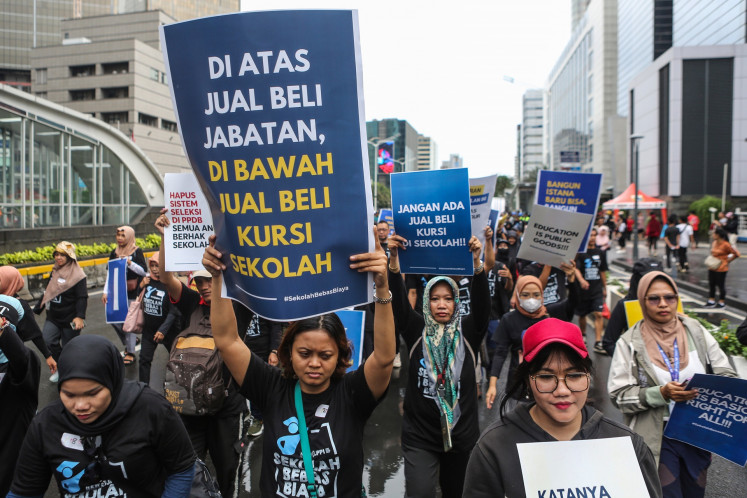Jokowi and English: Beyond language speaking
Following the recent presentation of President Joko âJokowiâ Widodo in Beijing, my Twitter, Path and Facebook timelines were flooded with arguments and discussions about his performance at the CEO Summit of the Asia and Pacific Economic Cooperation (APEC) forum
Change text size
Gift Premium Articles
to Anyone

F
ollowing the recent presentation of President Joko 'Jokowi' Widodo in Beijing, my Twitter, Path and Facebook timelines were flooded with arguments and discussions about his performance at the CEO Summit of the Asia and Pacific Economic Cooperation (APEC) forum.
Many of the netizens' contemptuous comments focused on his inadequate or even 'embarrassing' English, for a leader representing Indonesia on the international stage.
As a Surabayan with a thick Javanese accent working in Jakarta, I can relate to that experience. Oftentimes, I have received similar derogatory remarks when speaking in English.
The remarks are riddled with the biased notions that regional accents are somehow an indication of low intelligence and social class. It is almost a consensus that the absence of an accent, the use of complex diction and native-like fluency are considered the traits of 'proper English'.
This general language and accent discrimination has been going on for a long time and no one seems to mind it. In a way, Jokowi's presentation at the summit was actually an eye-opener, particularly from a social-cultural perspective and with regard to access to language education.
In fact, the ongoing debate about how poor his English is exhibits a serious distortion of how most Indonesians perceive the English language and our identity as Indonesians, thus clearly exposing their language insecurity.
On social media platforms, commentators repeatedly compared other political figures' use of English with that of Jokowi. His former rival Prabowo Subianto and predecessor Susilo Bambang Yudhoyono were among those considered to possess the standard of English that many believe a head of state should possess. Such a comparison is inaccurate and not like-with-like.
Many overlooked the fact that both Yudhoyono and Prabowo studied at Fort Benning, US. In addition, Prabowo was born into a privileged family and was briefly educated in London. Both had enough access and exposure to study and interact in English that allowed them to speak fluently in a clear accent in favor of the 'golden language', a term known for accents or languages that have the upper hand in social and political circumstances.
It is time to end the desperate attempt and pressure to sound native when speaking English.
This shows many Indonesians believe that proper English can only be acquired by a handful of people with high access to language education.
Many of us Indonesians still fantasize that good English speakers should have either an American or British accent, history of intensive language training or an overseas education.
What happens to those who do not have access to these? Can they ever be a good English speaker as well? Do all Indonesian children need to be that privileged so they can conduct presentations on the international stage?
Obviously, the judgment of how one is perceived to be speaking English properly is biased and unfair to the disadvantaged.
We may wish that there were more children and young people in Indonesia with the capacity to communicate in English fluently but evidently we still cannot disregard the existence of language discrimination.
We bash people who speak English with regional accents. We ridicule those who speak in a humble sentence structure.
If we want more Indonesians to be able to communicate in a foreign language, why are we so belligerent when people with limited means are finally able to present something in English?
Even worse, it is the underprivileged groups who are always deemed as incompetent English speakers. This is quite a contradiction and a double standard for a nation that constantly complains about not having enough English speakers to compete in global job markets.
When Jokowi made his presentation in very simple, yet understandable, English, he was criticized for sounding too 'proletarian' for an English speaker. However, Jokowi's background is indeed proletarian. He did not go to an international school, receive English-language education or even study abroad. However, the President acquired enough English to get by when he was still a furniture businessman.
Clearly, his limited exposure to English-language training did not hinder him picking up the English language. His vocabulary is probably modest but it served the purpose for the audience. For that, Jokowi is an ideal representation of most Indonesians, who have not had exposure to sophisticated language training.
Rather than forcing English-language learners in Indonesia to receive the same education access as privileged individuals just to
receive validation for speaking 'proper English', we should be encouraging them to learn English and communicate from the perspective of local contexts.
Moreover, we should reward people like Jokowi and others who work hard learning English without 'proper' language education access.
Most importantly, it is time to debunk the obsession with trying to sound or relate ourselves to the 'foreignism' of English language-learning and communication, and start embracing our own accents and language styles. It is time to end the desperate attempt and pressure to sound native when speaking English. Such insecurity will only impede and discourage learning.
I can say so because it is an unspoken truth that children nowadays learn English more outside the school context than within the classroom. Now that the 2013 National Curriculum no longer requires English at the elementary level, the economically deprived children in urban areas will learn and speak English by need, from the media and Internet.
Hence there will be more children like Jokowi, who communicate in English in their localized yet distinctive strategy.
Indonesians, inevitably, will have their very own version of English just like the Indians and Singaporeans.
Contrary to pessimistic netizens, I see Jokowi as an inspiration for English-language learners in Indonesia. His confidence in presenting his message in an international medium despite his limited exposure to private or international education was an exemplary action that I dare anyone to do and to emulate.
It is crucial to push the belief that communicating in English confidently is very much doable and possible, albeit in an accented and non-native way, and that English belongs not only to the Americans or British (or any other people from English-speaking countries),but everyone in the world who wishes to speak it.
________________
The writer works in education management in Jakarta and is an English-language instructor. She was previously a teaching associate of Indonesian at the Arizona State University as part of the Fulbright program.









